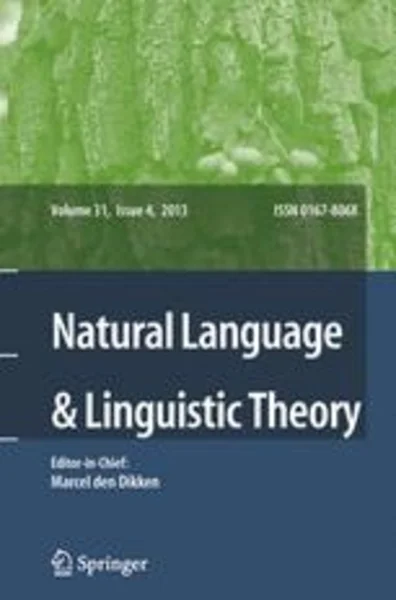-
anticausatives in sinhala: involitivity and causer suppression
جزئیات بیشتر مقاله- تاریخ ارائه: 1392/03/01
- تاریخ انتشار در تی پی بین: 1392/03/01
- تعداد بازدید: 467
- تعداد پرسش و پاسخ ها: 0
- شماره تماس دبیرخانه رویداد: -
many recent theories of causative/inchoative alternations adopt an anticausativization analysis, wherein the inchoative is derived from the causative via some operation that eliminates the causer argument from a verb’s argument structure, provided the causer is semantically unspecified for agentivity (levin and rappaport hovav 1995; chierchia 2004; koontz-garboden 2009). we explore the properties of such an analysis for causative/inchoative alternations in colloquial sinhala, which are overtly indicated via a volitive/involitive stem contrast on the verb. we argue that the alternation arises from a causer suppression operation that deletes the causer syntactically but preserves it semantically, albeit formally marking it as unresolvable for agentivity. this prevents the verb from occurring in certain contexts requiring agentivity of a syntactically active argument, including the volitive stem, although such a reading may be derived pragmatically. the patient in turn shows a case alternation that we argue reflects two ways the suppressed causer can be interpreted—via reflexivization or existential binding. these data, we argue, support an anticausative analysis as elimination of causers unspecified for agentivity. they also expand the typology of ways agentivity is encoded and left unspecified, how causer elimination can occur, and what types of overt morphology can indicate the alternation.
مقالات جدیدترین رویدادها
-
استفاده از تحلیل اهمیت-عملکرد در ارائه الگوی مدیریت خلاقیت سازمانی و ارائه راهکار جهت بهبود
-
بررسی تاثیر ارزش وجوه نقد مازاد بر ساختار سرمایه شرکت های پذیرفته شده در بورس اوراق بهادار تهران
-
بررسی تأثیر سطح افشای ریسک بر قرارداد بدهی شرکت های پذیرفته شده در بورس اوراق بهادار تهران
-
بررسی تأثیر رتبه بندی اعتباری مبتنی بر مدل امتیاز بازار نوظهور بر نقد شوندگی سهام با تأکید بر خصوصی سازی شرکت ها
-
تأثیر آمیخته بازاریابی پوشاک ایرانی بر تصویر ذهنی مشتری پوشاک ایرانی (هاکوپیان)
-
بررسی وضعیت مبلمان شهری پیاده روها با تاکید بر روان شناسی محیطی"مطالعه موردی، شهر ساری"
-
تاثیر پرده سپر مایل بر خصوصیات جریان و فشار بالابر در پی سدهای نفوذناپذیر
-
بررسی فعالیت انتی اکسیدانی عصاره آبی و متانولی هسته سیب
-
مفهوم زیبایی و مولفه های بصری تاثیرگذار آن در طراحی شهری
-
a new approach for eigenvalue assignment in descriptor systems with output feedback matrix
مقالات جدیدترین ژورنال ها
-
مدیریت و بررسی افسردگی دانش آموزان دختر مقطع متوسطه دوم در دروان کرونا در شهرستان دزفول
-
مدیریت و بررسی خرد سیاسی در اندیشه ی فردوسی در ادب ایران
-
واکاوی و مدیریت توصیفی قلمدان(جاکلیدی)ضریح در موزه آستان قدس رضوی
-
بررسی تاثیر خلاقیت، دانش و انگیزه کارکنان بر پیشنهادات نوآورانه کارکنان ( مورد مطالعه: هتل های 3 و 4 ستاره استان کرمان)
-
بررسی تاثیر کیفیت سیستم های اطلاعاتی بر تصمیم گیری موفق در شرکتهای تولیدی استان اصفهان (مورد مطالعه: مدیران شرکتهای تولیدی استان اصفهان)
-
استقرار سازمان یاد دهنده مولفه ای اثر گذار بر چابکی سازمان و بهبود عملکرد سازمان
-
تاثیر سرمایه فکری بر رابطه بین حاکمیت شرکتی و عملکرد شرکت های پذیرفته شده در بورس اوراق بهادار تهران
-
تحلیل استاتیکی غیرخطی (پوش آور) ساختمانهای با قاب خمشی فولادی دارای طبقه نرم
-
بررسی رابطه بین حمایت سازمانی ادراک شده و رفتار شهروندی سازمانی کارکنان شعب بانک سپه استان فارس
-
بررسی و نقد دیدگاه برتری مردان بر زنان با تکیه بر آیه ی«الرِّجالُ قَوّامُون علی النِّساء»




سوال خود را در مورد این مقاله مطرح نمایید :